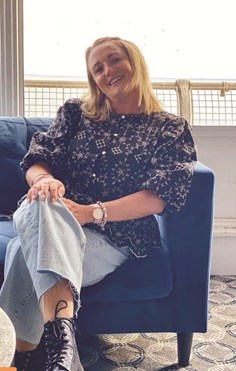Foster parent
Each issue, a professional shares their expert advice and gives information to help your child. This time, Joanne, a foster parent of a deaf child, shares her thoughts.

Why did you and your husband choose to become foster parents?
When I was six years old, the charity Barnardo’s came to my primary school to give a talk about fostering. It’s something I’ve wanted to do ever since. My husband, Kieran, and I have been fostering children and young people for five years. We also have two biological children, who understand the importance of fostering and support us with caring for the children in our care.
Did you have any experience of deafness before you fostered a deaf child?
My background is in working with children and adults with special educational needs and disabilities. One child I worked with as a teaching assistant had auditory neuropathy spectrum disorder (ANSD). We communicated using Makaton, so I had a little experience of signing but I hadn’t used British Sign Language (BSL) before.
We’ve also fostered children with additional needs before, so we have lots of experience of caring for children who communicate in different ways.
How did you prepare for fostering a deaf child?
We were told that Jack, who’s profoundly deaf and has cochlear implants, had been referred to us one month before he moved into our house. Jack only wears one of his processors and uses BSL. We signed up for a BSL course and downloaded BSL apps. To help Jack get used to living with us, we met him in familiar surroundings first, then he came to our house for short visits and then he stayed for dinner. He moved his belongings to our house gradually, each time he came to visit, and after a month, he moved in properly.
What are the most rewarding parts of being a foster parent to a deaf child?
It’s brilliant to see Jack open up, become more confident, use BSL effectively and give his all to new experiences.
What are the most challenging parts of being a foster parent to a deaf child?
I sometimes worry that Jack’s not able to communicate his worries and concerns with us.
What would be your advice to another family who is considering fostering a deaf child or young person?
Even if the deaf child or young person who’s coming to live with you doesn’t sign, it’s still useful to learn a bit of BSL to help with communication when they have their hearing aids or cochlear implants out. I’d recommend signing up to a BSL course and downloading apps to support your learning. As with any foster placement, you need to take the time to get to know the child you’re looking after. It might take a while for them to open up. Most importantly, encourage the child or young person to be proud of their deaf identity.
